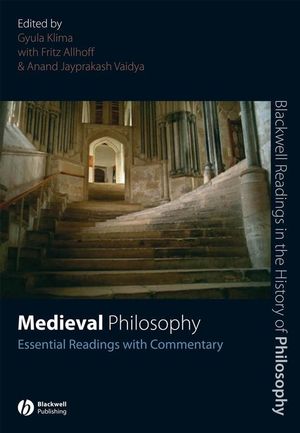Medieval Philosophy: Essential Readings with CommentaryISBN: 978-1-4051-3564-1
Hardcover
408 pages
July 2007, Wiley-Blackwell
 This is a Print-on-Demand title. It will be printed specifically to fill your order. Please allow an additional 15-20 days delivery time. The book is not returnable.
Other Available Formats: Paperback
|
||||||
Acknowledgments.
General Introduction.
Part I: Logic and Epistemology.
Introduction.
Philosophy, Theology, Logic, and the Sciences.
1. Augustine on Ancient Philosophy.
2. Dialectica Monacensis (anonymous, twelfth century) on the Division of Science.
3. Thomas Aquinas on the Nature and Scope of Sacred Doctrine.
The Problem of Universals.
4. Boethius Against Real Universals.
5. John of Salisbury on the Controversy over Universals.
6. The Summa Lamberti on the Properties of Terms.
7. William Ockham on Universals.
8. John Buridan on the Predicables.
Illumination vs. Abstraction, and Scientific Knowledge.
9. Augustine on Divine Ideas and Illumination.
10. Thomas Aquinas on Illumination vs. Abstraction.
11. Thomas Aquinas on our Knowledge of the First Principles of Demonstration.
12. Henry of Ghent on Divine Illumination.
13. Duns Scotus on Divine Illumination.
Knowledge and Skepticism.
14. Augustine on the Certainty of Self-Knowledge.
15. Thomas Aquinas on whether the Intellect Can Be False.
16. Henry of Ghent on whether a Human Being Can Know Anything.
17. Nicholas of Autrecourt on Skepticism about Substance and Causality.
18. John Buridan on Scientific Knowledge.
Part II: Philosophy Of Nature, Philosophy of the Soul, Metaphysics.
Introduction.
Hylomorphism, Causality, Natural Philosophy.
19. Thomas Aquinas on the Principles of Nature.
20. Thomas Aquinas on the Mixture of Elements.
21. Giles of Rome on the Errors of the Philosophers.
22. Selections from the Condemnation of 1277.
23. John Buridan and the Impetus Theory of Projectile Motion.
Human Nature and the Philosophy of the Soul.
24. Augustine on the Soul.
25. Averroës on the Immateriality of the Intellect.
26. Siger of Brabant on the Intellective Soul.
27. Thomas Aquinas on the Nature and Powers of the Human Soul.
28. John Buridan on the Immateriality of the Soul.
Metaphysics, Existence, and Essence.
29. Avicenna on Common Nature.
30. Thomas Aquinas on Being and Essence.
31. John Buridan on Essence and Existence.
God’s Existence and Essence.
32. Augustine on Divine Immutability.
33. Anselm of Canterbury on God’s Existence.
34. Thomas Aquinas on God’s Existence and Simplicity.
PART III: PRACTICAL PHILOSOPHY.
Introduction.
Goodness and Being.
35. Augustine on Evil as the Privation of Goodness.
36. Augustine on the Origin of Moral Evil.
37. Boethius on Being and Goodness.
38. Thomas Aquinas on the Convertibility of Being and Goodness.
Freedom of the Will.
39. Augustine on the “Divided Will”.
40. Boethius on Divine Providence and the Freedom of the Will.
41. Anselm of Canterbury on Free Will.
42. Henry of Ghent on the Primacy of the Will.
Virtues and Happiness.
43. Boethius of Dacia on the Supreme Good.
44. Thomas Aquinas on Happiness.
Divine Law, Natural Law, Positive Law.
45. Thomas Aquinas on Natural Law and Positive Law.
46. John Duns Scotus on Natural Law and Divine Law.
Suggestions for Further Reading.
Index



